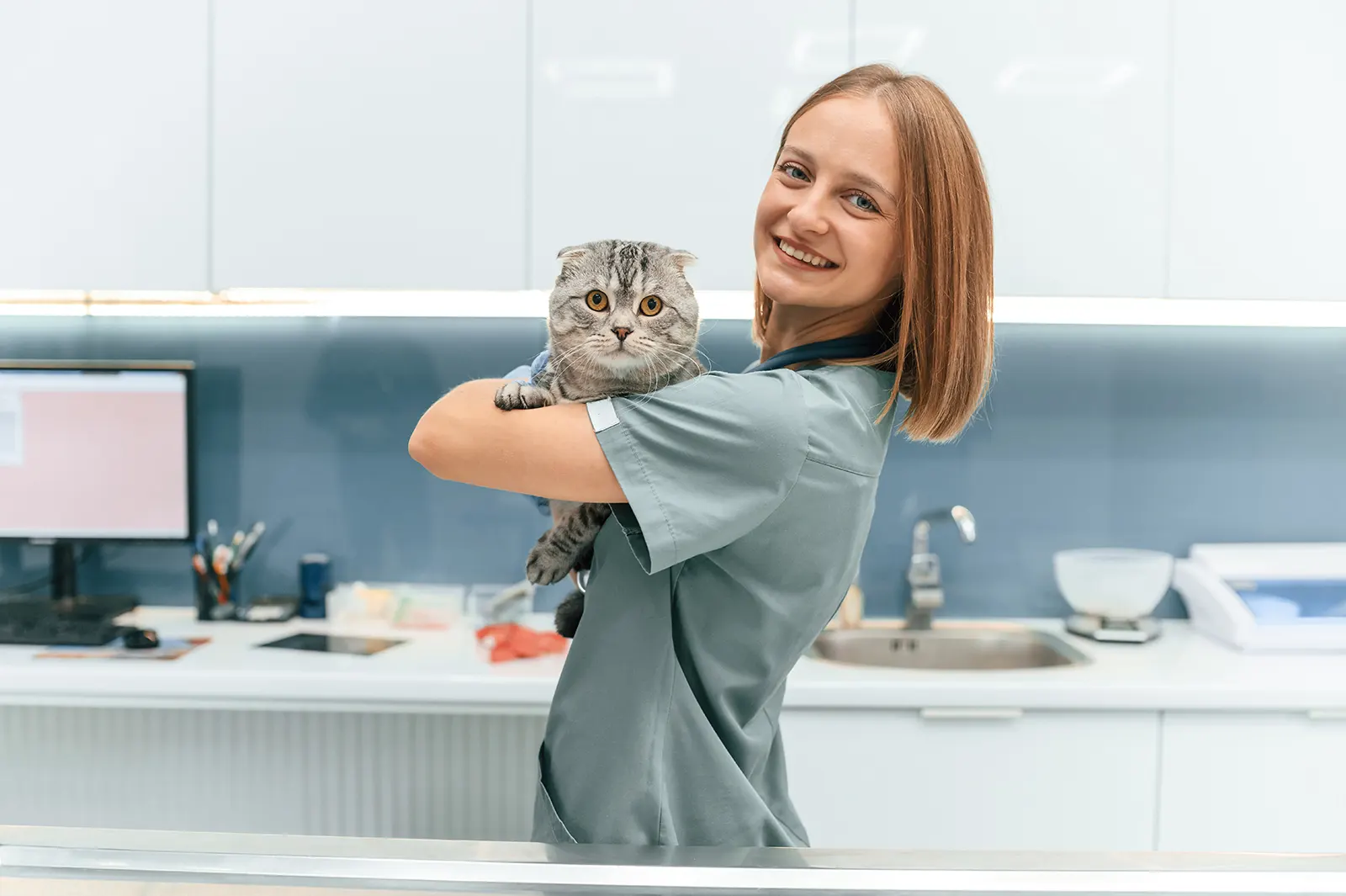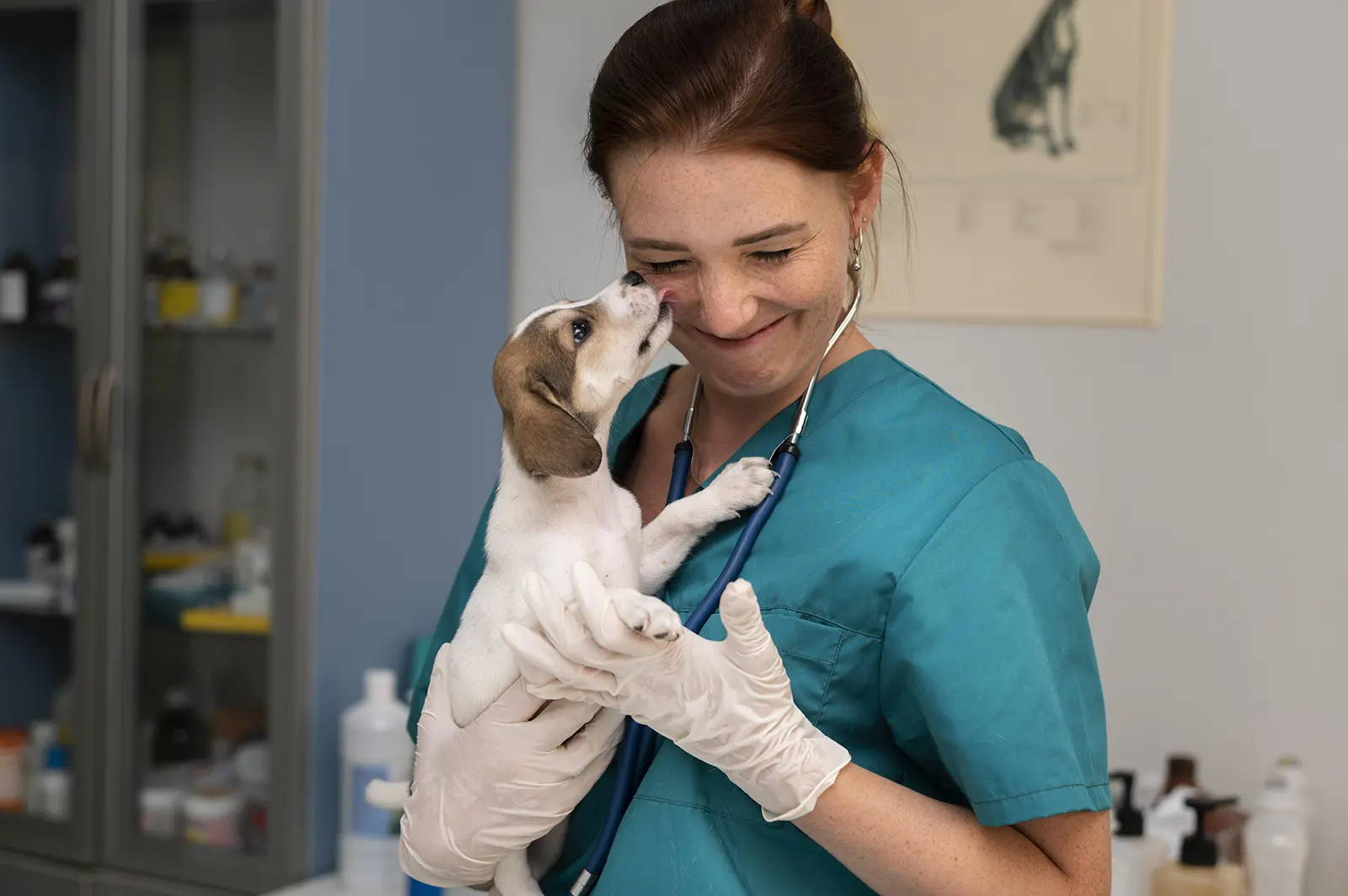What A-levels do you need to be a vet? The Ultimate Guide 2026

December 9, 2025 | 2 months | By Career
In This Article:
Dreaming of a career caring for animals? Becoming a veterinarian is one of the most rewarding career paths, but it requires careful academic planning from your A-level choices onwards. If you're wondering what A-levels you need to be a vet, here they are:
- Biology - Essential for understanding animal physiology and anatomy
- Chemistry - Required for pharmacology, biochemistry, and diagnostic procedures
- A third science or mathematics subject - Physics, Mathematics, or Further Mathematics
Most UK veterinary schools require a minimum grade of A or A* in Biology and Chemistry, with many preferring all three subjects at an A grade or above. The competition is fierce, making excellent grades crucial for your application success.

What A Levels are best for veterinarians?
Core A Level subjects
Biology
Biology forms the foundation of veterinary medicine and is a universal requirement for all UK veterinary schools. This subject provides essential knowledge about:
- Animal anatomy and physiology - Understanding how different body systems work in various species
- Cell biology and genetics - Crucial for diagnosing hereditary conditions and understanding breeding programs
- Ecology and animal behaviour - Important for wildlife veterinary work and understanding animal welfare
- Disease processes - Basic understanding of how illnesses develop and progress
Your A-level Biology studies will directly support your veterinary degree modules including anatomy, physiology, pathology, and animal welfare. The analytical thinking skills developed through studying biological processes will prove invaluable when diagnosing complex animal health issues.
Chemistry
Chemistry is equally essential and required by virtually all veterinary schools. This subject underpins many aspects of veterinary practice:
- Pharmacology - Understanding how medications work at a molecular level
- Biochemistry - Essential for interpreting blood tests and understanding metabolic processes
- Anaesthesia - Knowledge of chemical interactions is crucial for safe anaesthetic procedures
- Diagnostic testing - Many laboratory tests rely on chemical principles
Your chemistry background will be particularly valuable during your veterinary pharmacology modules, where you'll learn about drug interactions, dosages, and treatment protocols. The problem-solving skills developed in chemistry will help you approach complex medical cases systematically.
Physics
Physics provides essential understanding for modern veterinary practice. Veterinary medicine increasingly relies on sophisticated diagnostic equipment, and understanding the physical principles behind these technologies gives you a significant advantage. Physics offers:
- Diagnostic imaging - Understanding X-rays, ultrasound, and MRI principles
- Surgical equipment and laser therapy - Knowledge of how medical devices function
- Biomechanics and orthopaedic procedures - Forces and movement in animal bodies
- Radiation safety protocols - Essential for safe use of imaging equipment
Topics such as waves, forces, and energy transfer are directly related to ultrasound imaging, orthopaedic procedures, and physiotherapy treatments, making Physics invaluable for modern veterinary practice.
Exploring other career options? Find out what a levels do you need for marketing.
Useful A Level subjects
Science
Some schools offer A-level Science as a broad-based qualification that covers the principles of biology, chemistry, and physics. This interdisciplinary approach provides a comprehensive foundation in scientific thinking and methodology. A-level Science develops:
- Scientific inquiry skills - Essential for evidence-based veterinary practice
- Laboratory techniques - Valuable for diagnostic procedures and research
- Understanding of scientific principles - Applicable across all areas of veterinary medicine
- Critical evaluation of data - Important for interpreting research and making clinical decisions
While less common than individual science subjects, A-level Science can provide solid preparation for veterinary studies, particularly when combined with more specialised subjects like Biology and Chemistry.
Maths
Mathematics develops critical analytical thinking and problem-solving skills that are invaluable in veterinary practice. You'll use mathematical concepts daily to calculate drug dosages, interpret statistical research, and manage practice finances. The logical approach required for mathematics mirrors the systematic thinking needed for differential diagnosis.
Further Maths
For the most competitive applicants, Further Mathematics demonstrates exceptional academic ability and provides advanced mathematical tools useful in veterinary research and epidemiology.
Geography
Geography may seem unusual, but it offers valuable insights into environmental factors that affect animal health, the impacts of climate change on wildlife, and global disease patterns. This knowledge is particularly relevant for those interested in conservation medicine or international veterinary work.
Exploring other career options? Find out what A-levels you need for law..

What subjects should I take for veterinary medicine: Best A Level combinations
Biology + Chemistry + Physics
This traditional science combination provides the strongest foundation for veterinary studies. It covers all the physical sciences that underpin modern veterinary medicine and is favoured by most admissions tutors. This combination is particularly recommended if you're interested in working in clinical attention, as in:
- Small animal practice with advanced diagnostic capabilities
- Equine practice focusing on sports medicine and surgery
- Exotic animal medicine requires diverse technical skills
Biology + Chemistry + Maths
An excellent alternative that combines essential biological and chemical knowledge with strong analytical skills. Mathematics is increasingly valuable in modern veterinary practice for research, epidemiology, and practice management. This combination suits students interested in:
- Veterinary research and development
- Large animal practice with herd health management
- Veterinary public health and epidemiology
Biology + Chemistry + Geography
While less common, this combination offers unique insights into environmental veterinary medicine. Geography provides an understanding of climate, ecosystems, and human-animal interactions that are increasingly relevant in modern veterinary practice. Consider this combination if you're passionate about:
- Wildlife and conservation medicine
- International veterinary work
- Environmental health and One Health initiatives

Which veterinary course is best? Top 5 UK Universities
Cambridge University
Cambridge is ranked Number 1 in the UK for Veterinary Medicine (The Complete University Guide 2025) and offers a unique 6-year VetMB program. The course is structured, with the first three years focusing on the scientific principles underlying veterinary medicine, while the last three years apply this knowledge to clinical scenarios and practice. Cambridge is distinctive in being the only UK vet school to offer financial support for EMS placements, providing £150 in each of years 1, 2, 4, 5 and 6. Their facilities include state-of-the-art equipment, small animal surgical facilities, active ambulatory farm animal and equine teams, and a variety of imaging modalities, including MRI.
University of Liverpool
Liverpool's School of Veterinary Science boasts world-class academics, clinical facilities and research that enrich the learning environment. They have one of the widest-ranging research programmes in the UK, undertaking interdisciplinary and translational research that benefits the health and wellbeing of animals and people. The school stands out for its state-of-the-art facilities with over 100 veterinary surgeons working in their referral hospitals and veterinary practices, providing extensive clinical exposure for students.
University of Edinburgh
The Royal (Dick) School of Veterinary Studies at Edinburgh is a world leader in veterinary education, research, and clinical practice, at both undergraduate and postgraduate level. As Scotland's only veterinary school, Edinburgh offers unique opportunities for specialisation and medical and veterinary research. The University of Edinburgh has an impact in more than 100 countries, including many developing countries. Their integrated approach combines veterinary and medical research for comprehensive training.
Royal Veterinary College
The RVC offers the BVetMed programme with a 'spiral' curriculum, where key concepts are presented repeatedly as you progress through the course, at increasingly complex levels and in different contexts. Students benefit from teaching across both Camden and Hawkshead campuses, spending the first two years primarily at Camden before moving to Hawkshead for clinical training. The RVC requires extensive work experience, including 70 hours in veterinary practices and 70 hours in non-clinical animal environments, within 18 months of the application date.
University of Bristol
Bristol Veterinary School benefits from a brand-new curriculum with cutting-edge, evidence-based teaching methods, including case-based learning, signposting lectures, and authentic coursework. Students experience a dual-campus approach, learning across both the city (Clifton) and rural (Langford) campuses. Bristol offers excellent global opportunities, as graduates can pursue international career paths due to various accreditations, including those from the American Veterinary Medical Association (AVMA), alongside RCVS and EAEVE accreditations.
What qualifications do you need to be a vet in the UK?
| A Levels | GCSEs | UCAS | BTEC | International Baccalaureate | |
| Cambridge University | A*AA | Chemistry | Biology, Maths or Physics | — | 152 | Do not replace A-levels | 41-42 points overall, with 776 at HL |
| University of Liverpool | AAA | Biology | Chemistry | 2 GCSEs | English | Maths | 144 | — | 36 points overall | Biology grade 6 at HL | Chemistry grade 6 at HL | Another subject grade 6 at HL |
| University of Edinburgh | AAA | Chemistry | Biology | English at C/4 | 144 | — | 38 points overall, with 666 at HL. | Chemistry | Biology | Another subject |
| Royal Veterinary College | AAA | Biology | Chemistry (Including practicals) | 77777 | English | Maths | Science (Double Award) OR Biology + Chemistry OR Science + another science | 144 | Applied Science D*D*D* | 666 at HL. | Chemistry | Biology | Another subject |
| University of Bristol | AAA | Chemistry | Biology, Physics, Maths or Further Maths | — | 144 | Applied Science DDD | 36 points overall with 18 at HL. | Chemistry grade 6 at HL | Biology, Physics or Maths grade 6 at HL. |
Check university websites for more details.
Many students choose to sit A levels privately to have more flexibility in their study schedule, especially when balancing work experience requirements. Adult learners interested in veterinary medicine can also explore how to take A-levels as a mature student for guidance on returning to education.
Bonus track: 4 keys to ace your veterinary application
Participate in volunteer work
Veterinary schools seek genuine commitment to animal welfare. Volunteer at animal shelters, wildlife rescue centres, or conservation projects. This experience demonstrates your dedication while providing valuable insights into animal behaviour and welfare issues.
Help veterinarians at their office
Work experience in veterinary practices is essential. Aim for variety - spend time in small animal clinics, farm practices, and specialist centres. Most schools require a minimum of two weeks' experience, but successful applicants often have much more.
Take related courses
Consider additional qualifications, such as animal care courses or first aid training. These demonstrate continued learning and provide practical skills that complement your A-level studies.
Practice for your interview
Veterinary school interviews are challenging, often including ethical scenarios and technical discussions. Practice articulating your motivations clearly and stay informed about current veterinary and animal welfare issues.
The more you learn, the less you pay!
Check CloudLearn's bulk discounts for enrolling in several courses at once.
Find out more
Start your veterinary career with Cloudlearn
Achieving the A-level grades needed for veterinary school requires excellent preparation and support. CloudLearn's online A-level courses provide the flexibility and expert tuition you need to excel in Biology, Chemistry, and your chosen third subject. Our experienced tutors understand veterinary school requirements and can help you achieve the grades you need for your dream career.
Frequently Asked Questions
Do I need higher Maths to be a vet?
While A-level Mathematics is sufficient for most veterinary schools, Further Mathematics can strengthen your application, especially for competitive institutions like Cambridge. It's not essential, but it demonstrates exceptional academic ability.
Can I be a vet without Biology A-level?
No, Biology A-level is essential for all veterinary schools in the UK. It provides fundamental knowledge about living organisms that forms the basis of veterinary education. In any case, you may replace this A-level with an equivalent qualification, like the International Baccalaureate, but this subject is of utmost importance for this degree.
Is veterinary Science hard to get into?
Yes, veterinary science is one of the most competitive degree courses in the UK, with most entry requirements at grades A*AA and AAA. Strong grades, relevant experience, and excellent interview performance are essential.
Do you need all 3 sciences to be a vet?
While Biology and Chemistry are universally required, the third subject doesn't always need to be a science. However, Physics or Mathematics are strongly preferred as they provide relevant knowledge for modern veterinary practice. Some schools may accept other subjects, but science combinations are safer choices.
What A Levels do you need to be a veterinary nurse?
Veterinary nursing typically requires 2-3 A-levels, including Biology and another science or Mathematics. Entry requirements are generally lower than veterinary medicine (typically BBC-ABB), making it an alternative route into animal healthcare.
Can you be a vet without Science A Levels?
No, you cannot become a veterinarian without holding A-levels in science. While you may not take the Science A-level per se, Biology and Chemistry are mandatory requirements for all UK veterinary schools, and a third science or mathematics subject is strongly preferred.
What A-levels do you need to be an equine vet?
Equine veterinarians need the exact A-level requirements as other veterinarians: Biology, Chemistry, and a third subject (preferably Physics or Mathematics). Some universities offer equine-focused modules within their veterinary degrees, but the entry requirements remain consistent across all veterinary specialisations.